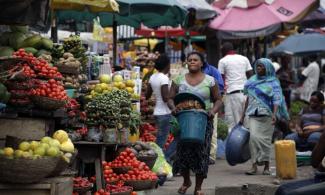
While inter-state travel across the country has been banned by the federal government, vehicles carrying essential supplies, as well as essential personnel, retain unrestricted movement. Effiong said the reality on the ground tells a different story.
One month after the Nigerian government shaved N21.50 – 14.9 per cent off the country’s petrol pump price, the cost of other commodities, especially food items, are still going upward, SaharaReporters has gathered.
Experts believe this is down to other factors in the final cost of goods reaching the market having more weight than a litre of premium motor spirit (PMS).
Head of Research at SBM Intelligence, Ikemesit Effiong, believes the cost of transportation is the key input in the arbitrage increase Nigerians are still forced to put up with.
While inter-state travel across the country has been banned by the federal government, vehicles carrying essential supplies, as well as essential personnel, retain unrestricted movement. Effiong said the reality on the ground tells a different story.

He said, “On paper and television, the government said that but on the ground, there was a significant amount of dissonance in the execution of that strategy.
“Because of the decade long underfunding of security forces, the policemen and soldiers on the ground saw an opportunity to mine financial advantage from them keeping watch on the roads.”
Effiong also reckons that the federal government created some confusion, by responding to the outbreak one month after the index case was reported. He said states had preceded President Buhari’s lockdown to secure their borders, creating a crisis at the end of March that sellers took advantage of.
“Because the federal government took too long in articulating a coherent COVID-19 strategy, it opened the door for states to fill in the gaps,” he said.
“That was what led to all of the arbitrage and all of the payments that people have been making to move things from one part of the country to the other. Someone has to bear that cost and businesses have determined that it is the customer, the end consumer that bears it.”
SBM’s Jollof index, which measures the price of essential food commodities in the country, said in its Q1 2020 report that, “In the seventeen quarters in which we have compiled the Jollof Index, it is clear that the Coronavirus pandemic represents the single most disruptive determinant affecting food prices in the country.
“While prices followed an upwind, but a mostly gentle trend, the month of March was very different. In anticipation of a shutdown as a result of the COVID-19 epidemic, the extent of panic buying by Nigerian consumers was observed in the significant rises of such products as garri, rice, and tomatoes all across the surveyed markets, including a 122% increase in Ibadan, a 100% increase in Anambra, and 114% in Port Harcourt.”
There are no media reports of truck drivers complaining of extortion or harassment by security forces as Efiong asserted.
An inter-state haulage operator, Abubakar Ibrahim, corroborated his claims though.
He, however, feels the effect of the alleged bribe collection is too marginal to lead to the nature of price increase Nigerians in urban areas especially, are facing.
“Truck drivers who go out on the highway are delayed unnecessarily and made to cough out some money before they are allowed to proceed,” he alleged.
Reacting to the price increase he said, “I think it’s an attitude problem, we just like to cash in on disasters, even rainfall."
The National Bureau of Statistics selected food price watch for March, said the cost of tomatoes, eggs and a tuber of yam, increased more than it did in March 2019 and in February as well.
The federal government had first reduced pump price by N20 from N145 to N125 on March 18 and further down to N123.50 at the beginning of April.
A professor of economics, Sheriffdeen Tella, told Sahara Reporters that the weight of COVID-19 induced uncertainty among other factors that go into the final product is more than the drop in a litre of petrol.
“Pump price is just one of the other costs. Other costs are rising. If they are, then pump price will just be a marginal thing,” he said.
According to him, other inputs into production are regulated by demand and supply, not the federal government. The challenges faced by manufacturers in accessing these other materials have made their value soar higher than the government-controlled petrol price.
The price change ordered by the federal government failed to bring the price of a litre of petrol in the country below N145 in March, according to the NBS.
There was even a slight increase in the cost of diesel, which is deregulated. The commodity, which fuels many of the trucks that undertake the inter-state food supply journey, was valued at N226.25 in February and N226.78 in March.
Watchful Nigerians have their fingers crossed, waiting for the NBS to say if there was any decline in the price of PMS and essential food items in April but experts believe prices are not coming down anytime soon.
“There is the expectation that prices may rise further,” Professor Tella notes.